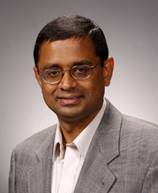SITIS'09
KEYNOTES
KEYNOTE 1
The Role of Interoperability Standards in Enabling Sustainable Enterprise
Rachuri Sudarsan (National Institute of Standards and Technology, Washington DC USA)
Abstract
This talk introduces a model of the information flows in an extended networked enterprise, serving as the basis for understanding the role of standards in manufacturing support systems. This requires a set of complementary and interoperable standards that cover the full range of aspects of the products' life cycle. . Sustainable Manufacturing is a systems approach for the creation and distribution of innovative products and services that minimizes resources (inputs such as materials, energy, water and land), eliminates toxic substances, and produces zero waste that in effect reduces carbon (including carbon equivalent) intensity across the entire lifecycle of products and services. The talk will also introduce a typology of standards relevant to support sustainable manufacturing enterprise system that addresses the hierarchy of existing and evolving standards and their usage and identifies a suite of standards supporting the exchange of product, process, operations and supply chain information. Consensus-based open standards that will form the basis for the future global information exchange in a seamless manner will need work towards developing semantics-based approaches
 Biography Dr. Rachuri Sudarsan is a computer scientist in the Design & Process Group in the Manufacturing Systems Integration Division at NIST . His primary objectives at NIST are to develop and transfer knowledge to industry, about information models for sustainable manufacturing, green products, assembly representation, system level analysis, and tolerance representation. Specific focus is on identifying integration and technology issues that promote industry acceptance of information models, product representation standards, system level tolerance analysis and open architecture that will enable designers to develop products that are sustainable and manufactured globally in a distributed and collaborative environment. Dr. Sudarsan's primary areas of interest are Sustainable Manufacturing, Green Engineering, Long Term Digital Archival, Scientific Computing, CAD/CAM/CAE, Design for Sustainability, Object Oriented Modeling, and Ontology.
Biography Dr. Rachuri Sudarsan is a computer scientist in the Design & Process Group in the Manufacturing Systems Integration Division at NIST . His primary objectives at NIST are to develop and transfer knowledge to industry, about information models for sustainable manufacturing, green products, assembly representation, system level analysis, and tolerance representation. Specific focus is on identifying integration and technology issues that promote industry acceptance of information models, product representation standards, system level tolerance analysis and open architecture that will enable designers to develop products that are sustainable and manufactured globally in a distributed and collaborative environment. Dr. Sudarsan's primary areas of interest are Sustainable Manufacturing, Green Engineering, Long Term Digital Archival, Scientific Computing, CAD/CAM/CAE, Design for Sustainability, Object Oriented Modeling, and Ontology.
KEYNOTE 2
Cyberinfrastructure and Cybersecurity: research issues, challenges and strategies
Aris M. Ouksel (The University of Illinois at Chicago, USA)
Abstract
Cyberinfrastructure is a major National Science Foundation (NSF) initiative to support research and development in science and engineering (including healthcare) in general and computer science in particular. I will discuss the rationale behind this initiative and its goals to support the development of large software projects in science and engineering, to foster collaboration among scientists nationally and internationally, to train and educate a skilled science and engineering workforce for the jobs of tomorrow, and to exploit and rationalize investments in advanced telecommunications infrastructure. Cybersecurity will also be discussed. It is an essential orthogonal dimension of Cyberinfrastructure. Finally, we will discuss the growing trend toward the automated generation of massive data at multiple distributed locations. Examples include systems to monitor the physical world, such as wireless sensor networks, and systems to monitor complex infrastructures, such as distributed Internet monitors. This trend will likely continue, leading to a future of computing that is data-rich, heterogeneous, distributed, and rife with uncertainty.
 Biography Dr Aris M. Ouksel is currently professor at the University of Illinois at Chicago. He received his M.Sc. in 1981 and the PhD degrees in computer science from Northwestern University in 1985. After four years abroad, teaching and consulting in information technology and strategic planning and technology transfer, he joined the College of Business Administration at the University of Illinois at Chicago, as a professor of information systems and information economics, and was for several years the Director of the Management Information Systems PhD program and the Director and Founder of the Center for Management of Information Technology and Telecommunications in the same college. Dr. Ouksel also holds an appointment at the Computer Science department. Dr Ouksel's research interests and contributions are in two tracks: (i) information economics and organizational learning and performance; (ii) semantic issues on the web in their applications bioinformatics, in forensics, and in virtual inter-organizational information systems, mobile ad-hoc networks, wireless and mobile sensor networks, and peer-to-peer data management. He holds US patents on sensor and mobile computing. He was for several years an associate editor at the Journal of Parallel and Distributed Databases (1999-2008) and the Knowledge Information Systems (2000-2005). He is currently associate editor of the Journal of E-Business Research (IJEBR) (2005-…), and the International Journal of Internet Social Networks (IJISN) (2007 -…). Aris has been the recipient of numerous grants from federal, state, and local agencies.
Biography Dr Aris M. Ouksel is currently professor at the University of Illinois at Chicago. He received his M.Sc. in 1981 and the PhD degrees in computer science from Northwestern University in 1985. After four years abroad, teaching and consulting in information technology and strategic planning and technology transfer, he joined the College of Business Administration at the University of Illinois at Chicago, as a professor of information systems and information economics, and was for several years the Director of the Management Information Systems PhD program and the Director and Founder of the Center for Management of Information Technology and Telecommunications in the same college. Dr. Ouksel also holds an appointment at the Computer Science department. Dr Ouksel's research interests and contributions are in two tracks: (i) information economics and organizational learning and performance; (ii) semantic issues on the web in their applications bioinformatics, in forensics, and in virtual inter-organizational information systems, mobile ad-hoc networks, wireless and mobile sensor networks, and peer-to-peer data management. He holds US patents on sensor and mobile computing. He was for several years an associate editor at the Journal of Parallel and Distributed Databases (1999-2008) and the Knowledge Information Systems (2000-2005). He is currently associate editor of the Journal of E-Business Research (IJEBR) (2005-…), and the International Journal of Internet Social Networks (IJISN) (2007 -…). Aris has been the recipient of numerous grants from federal, state, and local agencies.
KEYNOTE 3
Event-based Modeling of Semantics in Multimedia
Vincent Oria (The New Jersey Institute of Technology, Newark USA)
Abstract
Multimedia research has focused on finding the best descriptors for effective content-based retrieval based on low-level features. Although progress was made in specific areas such fingerprint, the solutions proposed in general fail to retrieve media objects semantically related. There exist applications for content-based multimedia retrieval but most computer users are still waiting for solutions to capture and query multimedia data based on their semantic content. The most popular multimedia applications online allow searching based on keywords previously gathered. This work is based on the observation that most multimedia data collected by people are normally used to witness real life events (e.g. wedding, anniversary, graduation, and birthday) and related objects (e.g. buildings, people, and pets etc.). Modeling the multimedia data along with the event they are about and the objects involved in these events can help capture semantics in these data. In addition, the events provide a natural way for multimedia data integration as several media devices are simultaneously used to capture the same events.




